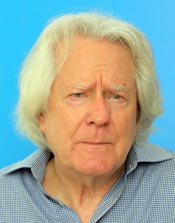Seeing the world through a lot of different eyes
1950s, Rhodesia; in a colonial bungalow,
an English boy is buried in a book- for there’s no TV, and living in an expat community means encounters with tribal people and wildlife from the bush are not common.

A. C. Grayling
Prof. A.C. (Anthony Clifford) Grayling,
philosopher and author, is grateful for that Anglo-African childhood with little resources other than many books. The now 74-year-old don has been an influential thinker over decades and has authored over 30 books.
It was when aged eleven that he was first impressed by how many great minds in the Western tradition “have devoted their lives to track down what really matters in life and the world”.
This drew him to philosophy; but it was a family tragedy that probably directed him towards the lofty plinth he is on today. When only 19, his elder sister was found dead in a river in Johannesburg. She had been born with brain damage, and after brain surgery to alleviate it at the age of 20 had experienced personality problems that led to emotional difficulties, and a premature marriage.
Grayling’s mother, already ill, died from a heart attack when they went to identify her daughter.
The only way the teenager could find to deal with the grief was to pitch into work.
“When something is taken out of this world by a bad thing, we should put back into the world something good, and even better, to compensate.” His way to compensate was to engage in education and writing, and bring meaning to humanity through philosophical ideas.
At the heart of Prof. Grayling’s philosophy is the ‘great Socratic question’, ‘how should one live?’ ‘Contributing to the conversation society has with itself about possibilities for good lives in good societies’, Grayling writes widely on contemporary issues, including war crimes, the legalization of drugs, euthanasia, secularism, human rights and other topics in the tradition of polemics.
“In my book Philosophy and Life I give the universal argument that we all have the responsibility to increase the quantum good in the world; if the quantum of bad is bigger than the quantum of good the universe is a bad place.” On a more technical front, he is trying “to explain how we see the world from a very, very, very narrow perspective- we are creatures of a certain size and scale, with a certain cognitive endowment, and therefore our view of reality is very partial.
“And we try to extend that view through science and philosophy- but it is still our view, and we should try to understand the nature of that perspective.”
His early brushes with tribal people in Africa have also left this thirst to delve into other cultures.
“When you encounter different cultures, different experiences that people have, you can see in them the thoughts, the beauty, the ideas, the traditions, that shaped them- and it’s interesting to see how people see the world…” Seeing through a lot of different eyes is important because it makes us “more sympathetic, more tolerant and have more fellow feeling.” And this really is what “the world needs… There are many divisions in the world, and we need to understand one another better so we can live together in peace.”
So what is the best philosophical attitude to adopt in these very trying times? Prof. Grayling is cogent and simple:
“Be realistic; be positive. Every time something bad happens to the world you have to work- even in a small way- to give something better (back)….”
Searching for an ideal partner? Find your soul mate on Hitad.lk, Sri Lanka's favourite marriage proposals page. With Hitad.lk matrimonial advertisements you have access to thousands of ads from potential suitors who are looking for someone just like you.


